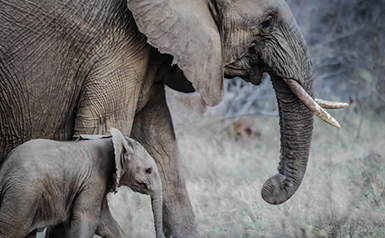LCA Blog
5 Ways to Be a Responsible Tourist & Help Keep Wildlife Wild
 With the summer months right around the corner, many are eagerly planning out their next vacation as they attempt to satisfy a serious case of wanderlust. And at the top of many tourists' bucket lists is the opportunity to interact with wildlife.
With the summer months right around the corner, many are eagerly planning out their next vacation as they attempt to satisfy a serious case of wanderlust. And at the top of many tourists' bucket lists is the opportunity to interact with wildlife.
Wildlife tourism accounts for about 20 to 40 percent of all global tourism. And while they may be a popular choice for tourists, wildlife encounters can be extremely harmful for wildlife and can even have deadly consequences. As millions of people flock to wildlife attractions each year, tourists are unknowingly supporting the exploitation and suffering of wild animals.
Given the rising number of species currently facing extinction at the hands of human activity, it is imperative that humans reduce their impact on the wild. For those looking to travel responsibly, here are five ways you can help keep wildlife wild during your next getaway.

Be a Responsbile Tourist: 5 Ways to Help Keep Wildlife Wild
1. Don't take selfies with wildlife
Avoid tourist attractions that use wild animals as photo props. Wild animals like tigers and lions are routinely drugged (some even have their teeth and claws removed!) in order to make them more docile so that humans can sit next to them for photos.
2. Don't visit attractions that exploit wildlife
Along with avoiding attractions that offer photo opportunities with wild animals, you should also avoid tourist attractions that exploit wildlife (e.g., swimming with dolphins and riding on the backs of elephants). Wild animals belong in the wild not in captivity!
3. Don't buy souvenirs made from animals
The illegal wildlife trade is a billion dollar industry that makes a profit off of exploiting the lives of animals. Some tourist attractions sell souvenirs and trinkets that are made from endangered species, such as tortoise shells, ivory, and reptile skin. Some also sell items made from the feathers, pelts, bones, and teeth of wild animals. Make it a point not to purchase souvenirs made from animals! Other common "trinkets" to avoid include coral and seashells!
4. Don't feed wildlife
Feeding wildlife disrupts the animals' natural behaviors, causing them to gradually lose their natural fear of humans and rely on them for food. Not only does this pose severe safety risks, it is also incredibly harmful for the animals' overall health as human food can cause serious health problems if ingested by animals.
5. Don't litter
This one might be a no-brainer, but trash is incredibly dangerous for wildlife, especially for marine species. Always make it a point to pick up after yourself! Take nothing but memories, leave nothing but footprints.
Photo: Unsplash
When you subscribe to the blog, we will send you an e-mail when there are new updates on the site so you wouldn't miss them.











